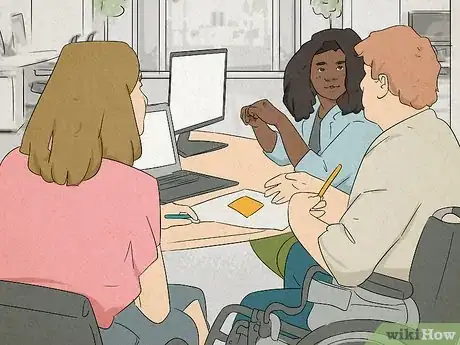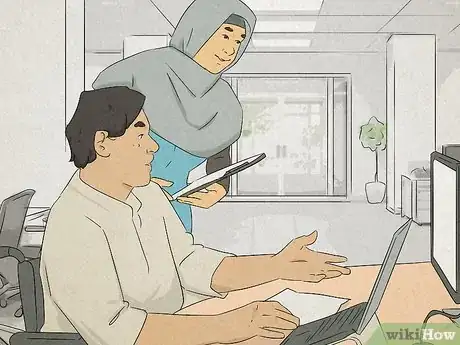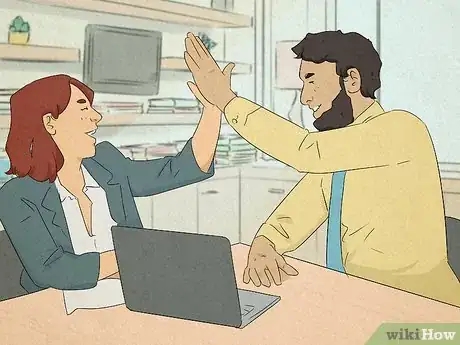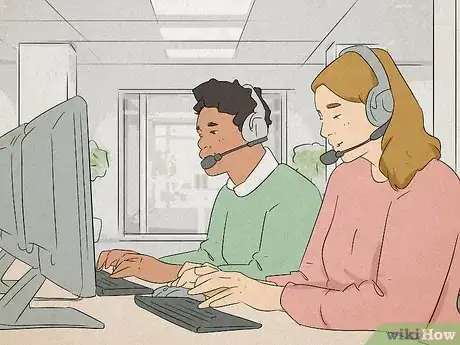This article was co-authored by Lynda Jean and by wikiHow staff writer, Madeleine Criglow. Lynda Jean is an Image Consultant and the Owner of Lynda Jean Image Consulting. With over 15 years of experience, Lynda specializes in color and body/style analysis, wardrobe audits, personal shopping, social and professional etiquette, and personal and business branding. She works with clients to enhance their image, self-esteem, behavior, and communication to facilitate their social and career goals. Lynda holds Bachelor degrees in Sociology and Social Work, a Master’s degree in Clinical Social Work, and a Certified Image Consultant (CIC) certification. She studied Image Consulting at the International Image Institute and the International Academy of Fashion and Technology in Toronto, Canada. Lynda has taught Image Consulting courses at George Brown College in Toronto, Canada. She is the co-author of the book, “Business Success With Ease,” where she shares her knowledge about, ‘The Power of Professional Etiquette.’
There are 11 references cited in this article, which can be found at the bottom of the page.
This article has been viewed 16,215 times.
Being friendly and social with your coworkers is a big part of most jobs. It can be a little nerve-wracking to socialize with coworkers, though, as you may not know them as well as close friends. Thankfully, there's a lot of simple things you can do to improve your social skills at work. If you're feeling shy or unsure of where to start, try these tips.
Steps
Greet everyone with a smile.
-
It's simple, but it makes a big impact. Try smiling at your coworkers and greeting them each day when you get to work. Even if you're a little nervous, it only takes a few seconds, and it can make you seem more friendly and approachable. Make eye contact, smile, and add a personalized hello to break the ice with your coworkers.[1] X Research source
- Try making yourself smile and say hello even when you're not exactly in the mood. It's a relatively painless way to be social with your coworkers, and it can make a world of difference in showing them that you care.
Maintain positive body language.
-
This helps you look more confident and approachable. When you're speaking to your coworkers, stand up straight, keep your head held high, and maintain direct eye contact. Relax your shoulders and arms so that you don't appear uncomfortable or tense. When your coworkers speak to you, lean in a little to show your interest. You'll appear both relaxed and sure of yourself at the same time, even if you're a little nervous on the inside.[2] X Research source
- If you're unsure, try mimicking the body language of your coworkers. It may sound strange, but it will help you seem more likable and invested in the conversation.
Use general conversation starters.
-
Talk about the weather or something you notice in the room. Say something like, "Wow, it's been so warm out lately!" or "I've never noticed that poster in the break room before." This gives the conversation a nice starting point with whoever you're talking with, and it breaks the ice without getting too personal.[3] X Research source
- Any casual small talk is fine—the most important thing is to engage with the people around you.[4]
X
Expert Source

Certified Image Consultant Expert Interview. 17 November 2020. - Remember to give people time to talk. A good conversation is about taking turns. If you've been doing most of the talking, pause so that your coworker can get a word in or share their perspective.
- End conversations on a good note. If you notice a natural stopping point in the conversation, politely excuse yourself from the conversation and leave your coworker with an invitation to talk again soon.
- Say something like, "I've loved talking about these ideas with you. I've got to get back to my desk, but please let me know if there's anything more we can discuss!'
- Any casual small talk is fine—the most important thing is to engage with the people around you.[4]
X
Expert Source
Compliment your coworkers.
-
These work as great conversation starters, too. If you notice your coworker is wearing a cool blazer, compliment them on it. People love to be flattered, and it will make them have a positive association with you.[5] X Research source
- Say something like, "I love that blazer, Tammy. It's got a great pattern."
- You can also praise someone for their performance in a meeting. Try, "I appreciated your feedback in the meeting. It's making me think of the project in a whole new way."
- If someone compliments you, graciously say something like, "Thank you so much, that means so much to me!"
Ask questions.
-
This shows your coworkers that you want to get to know them better. If you're unsure of what your coworker meant in conversation, ask to clarify their point of view. Maybe you understand, but just want to learn more. Ask follow-up questions. Your coworkers will be flattered by your curiosity, and it'll keep the conversation going.[6] X Research source
- Maybe your coworker just told you that they love to go camping. Ask something like, "What are your favorite camping spots?"
- If your coworker is always talking about their pets, you might say, "How's that cute little dog of yours?"
Listen to what your colleagues have to say.
-
Hear and reflect on what they share with you. Practice active listening strategies, like nodding and making eye contact as your coworkers speak and waiting until they've finished their thought to respond. These small changes can help you pay attention to your coworkers' perspectives and be more engaged in conversations.[7] X Research source
- If you're ever unsure about what a coworker meant, restate what they said in your own words to make sure you understood them correctly.
- Avoid just thinking about what you have to say in response while people speak to you. Hear them out first to fully participate in the conversation.
- Refer back to old conversations next time you talk to your coworkers. If a coworker mentioned that they were planning a summer trip the other day, ask them if they've made any progress on their plans next time you see them.[8] X Research source
Write clear, informative emails to your coworkers.
-
Written communication is a part of socializing in the workplace as well. Proofread before you hit send to avoid any awkward sentences or typos. Edit your emails for clarity and pay attention to the tone as well. You want the email to read as professional, friendly, and informative.[9] X Research source
- If you need to talk about a sensitive topic, set up an in-person meeting or video conference instead. Make your email simply about setting up a time to meet.
- This helps you avoid potential email miscommunications.
Adopt a team mentality and cooperate with your coworkers.
-
See your coworkers as collaborators instead of competition. Help your coworkers out if they ever need assistance. If you and a coworker don't see eye to eye, ask questions to understand their perspective and try to practice compassion regarding your differences.[10] X Research source
- Being a team player will help coworkers feel more comfortable around you and can increase your feelings of camaraderie.
Be receptive and flexible about feedback.
-
Look at constructive criticism as an opportunity to improve. Though it can be hard to hear feedback sometimes (especially if you disagree), listen to what your supervisors and coworkers have to say about your performance. Ask questions to understand their advice and thank them for sharing their point of view.[11] X Research source
- Avoid interrupting or dismissing your coworkers' feedback. Even if you disagree, respect their point of view and see it as an opportunity to get even better at your job and learn from your colleagues.
Be positive around your coworkers.
-
Too much negativity can bring people down. Keep a positive attitude, even when things get stressful at work, and remain friendly with your coworkers. Your coworkers will appreciate your hopeful attitude and it will even inspire them to think more positively themselves.[12] X Research source
- If you're having trouble being positive, start with positive self-talk. Anytime you're feeling down on yourself, think of all of your strengths and why your coworkers enjoy your company instead.[13] X Research source
- Replace thoughts like "I'm so awkward" or "No one in the office likes me" with things like "I'm always kind to everyone in the office" or "I'm super helpful and I always get my work done."
Respect your coworkers' boundaries.
-
Not everyone wants to be best friends with their coworkers. Being social in the workplace is super important, but everyone has their limits on how much they want to socialize. Read your coworkers' body language and verbal cues to understand their boundaries, and respectfully give your coworkers the space they need.[14] X Research source
- If you say hi to a coworker and they briefly nod before looking back at their work, they may be too busy for a full-on conversation.
- Be mindful of personal space. Though embracing your friends to greet them is perfectly acceptable, it's best to stick to a handshake or a wave when you're interacting with colleagues.
You Might Also Like
 20 Good Excuses to Miss Work on Short Notice
20 Good Excuses to Miss Work on Short Notice
 How to Call in Sick When You Have Diarrhea
How to Call in Sick When You Have Diarrhea

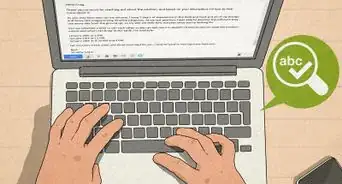 How to Respond When a Recruiter Reaches Out: 3 Email Templates and Key Tips
How to Respond When a Recruiter Reaches Out: 3 Email Templates and Key Tips
 Flirty or Friendly? 12 Signs Your Coworker Might Actually Be Flirting with You
Flirty or Friendly? 12 Signs Your Coworker Might Actually Be Flirting with You
 20+ Believable Excuses for When You’re Running Late
20+ Believable Excuses for When You’re Running Late
 How to Sell Your Skills: 10+ Great Ways to Put Yourself Out There
How to Sell Your Skills: 10+ Great Ways to Put Yourself Out There

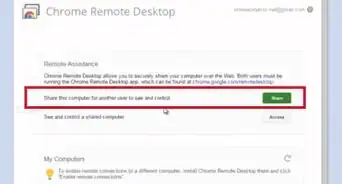

 15 Basic Skills You Need to Be a Good Housekeeper
15 Basic Skills You Need to Be a Good Housekeeper
 How to Find Out Where Someone Works: The Ultimate Guide
How to Find Out Where Someone Works: The Ultimate Guide


References
- ↑ https://www.inc.com/business-insider/why-you-should-greet-your-co-workers-everyday.html
- ↑ https://www.inc.com/peter-economy/18-ways-to-make-your-body-talk-the-language-of-success.html
- ↑ https://www.heretohelp.bc.ca/infosheet/effective-communication-improving-your-social-skills
- ↑ Lynda Jean. Certified Image Consultant. Expert Interview. 17 November 2020.
- ↑ https://www.theguardian.com/education/2016/may/18/not-feeling-confident-here-are-six-ways-to-fake-it
- ↑ https://psychcentral.com/lib/become-a-better-listener-active-listening
- ↑ https://psychcentral.com/lib/become-a-better-listener-active-listening
- ↑ https://www.inc.com/quora/10-simple-habits-that-will-noticeably-improve-your-social-skills.html
- ↑ https://www.snhu.edu/about-us/newsroom/2018/03/communication-skills
- ↑ https://www.forbes.com/sites/jacquelynsmith/2012/10/03/10-ways-to-get-your-colleagues-to-work-with-you-better/?sh=4b181eaf4daf
- ↑ https://uwaterloo.ca/centre-for-teaching-excellence/teaching-resources/teaching-tips/assessing-student-work/grading-and-feedback/receiving-and-giving-effective-feedback
- ↑ https://www.inc.com/quora/10-simple-habits-that-will-noticeably-improve-your-social-skills.html
- ↑ https://www.theguardian.com/education/2016/may/18/not-feeling-confident-here-are-six-ways-to-fake-it
- ↑ https://psychcentral.com/blog/how-to-respect-other-peoples-boundaries
- ↑ https://www.heretohelp.bc.ca/infosheet/effective-communication-improving-your-social-skills
About This Article







